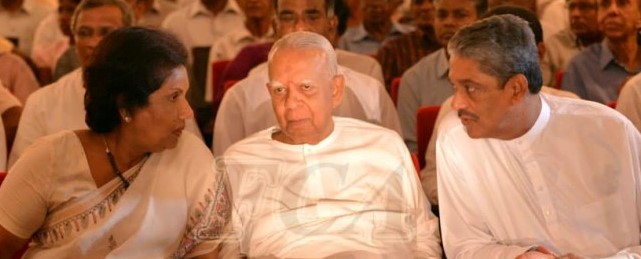By INSD –
We have had 35 years of the present constitution which has seen an escalation of the ethno-political conflict, the rise and fall of one of the deadliest separatist groups in the world, the evolution of a presidential system and the breakdown of democratic institutions about which the country was once proud of. Strengthening of executive presidency has had very wide ramifications, especially in today’s authoritarian environment. Undermining of rule of law, breakdown of law and order, impunity, assaults on the independence of judiciary, interference with institutions such as public service and police, lack of accountability, intolerance of dissent, pressure on the media and religious intolerance are all related to the authoritarian environment.
Corruption, wastage and extravagance have contributed to the depletion of public funds. The money so lost will be recovered from the ordinary citizen, by way of taxes. Rajapakse regime still basks in the glory of military victory. However the issues that led to the armed conflict remain unsolved.
The ideal and the realities on the ground
While comprehensive constitution reform is certainly the ideal, the realities on the ground force us to look for an alternative programme. The immediate task therefore is the creation of a democratic space where rational discussion can be held which will lead to further reform. A minimum requirement for the creation of a democratic space is the abolition of executive presidency. This should be attempted first.
However, the danger of delaying comprehensive constitutional reform, is that unforeseen factors coming in to play. We have seen in 1994 how delay contributed to political forces coming in to play and the reform process being derailed.
Despite this danger, replacing executive presidency with a parliamentary form of government needs to be the first reform. The abolished 17th Amendment to the Constitution which restricted powers of the executive presidency should to be brought back.
And there should be national consensus regarding important appointments for example the appointment of judiciary and independent commissions. Another proposal is to have a State Council with the representation of all political parties, chief ministers and a few eminent persons, jointly
nominated by the Government and the opposition.
Putting all eggs in the same basket
Ideally, the first stage of reforms should deal with the ethnic issue as well. However, putting all eggs in the same basket is not wise. First a democratic space should be created and then that space should be used for further reform.
Some issues remain to be addressed. UNP has indicated that they would like to have a directly elected prime minister. This position however is likely to change. When the Prime Minister is elected directly, the voters vote for the party, candidates as well as for the Prime Minister. The danger of this system is that the Prime Minister may not have a majority in the parliament which will make it difficult to pass the budget or legislation. Also, the similarities between a directly elected President and a directly elected Prime Minister who is the effective head of the executive will confuse people. Therefore having a directly elected Prime Minister will to be a mistake.
We also have a problem of trust deficit. Number of times the talk about abolition of executive presidency has been heard. It is therefore proposed that a constitutional draft including the abolition of executive presidency, re-enactment of 17th Amendment and establishment of the State Council is presented with the election manifesto. Ideally, a timeline should be included.
It is recommended to have a common candidate because we are up against a formidable president who is difficult to be brought down without a common candidate. Who the common candidate is, needs to be discussed.
Opposition parties are very likely to come together. It is also important that there is an SLFP break-away group. Sri Lanka Muslim Congress is very likely separate themselves from the government.
Hill-country Tamils
Hill-country Tamils will support only if it is clear that Mahinda Rajapakse is going to be defeated. Muslim Congress cannot afford to support Mahinda Rajapakse because Muslims will not vote for Mahinda Rajapakse. Ideally JVP should come on board to support the common candidate. But they also have bad experience about alliances. There is also talk that JVP will boycott the election. Bringing JVP on board is the challenge. It is the UNP that has the machinery. But after Uva elections UNP seems to be over-confident. It will be a mistake if they take things for granted. There is the perception that UNP is forcing themselves on others and this is hurting the movement. No party should impose itself on others.
Election of Uva Province shows potential for change. But the Sinhala Buddhist majority still supports Mahinda Rajapakse. However a majority of the Sinhala Buddhist vote is not essential for change. It is reasonably expected that numerically smaller communities; Tamils, Muslims and Hill-country Tamils, will vote against Mahinda Rajapakse in large numbers. If that happens, Rajapakse can be defeated even if a majority of Sinhala Buddhists support him.
There was violence and use of state resources at the Uva election. Money was spent. But the money spent will be nothing compared to the money that will be spent at the next election. This is another enormous challenge.
A common platform is necessary. A platform that gives the perception that Mahinda Rajapakse can be defeated. We will all have to compromise to achieve this end.
—————
From the report ‘Democratisation: Options and Challenges’ by the International Network of the Sri Lankan Dispora (INSD)
